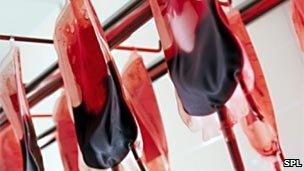ME patients face UK ban on donating blood
- Published

Donated blood is screened for common infections
Patients with ME will no longer be able to donate blood in the UK under new safety guidelines.
Officials say the ban, starting on 1 November, is designed to protect the health of people with ME - also known as chronic fatigue syndrome.
But the ME Association says the move is motivated by concerns that the illness may be caused by a virus similar to HIV that can be passed on via blood.
Prior to the ban ME patients could give blood provided they were in remission.
But the cyclical "relapsing-remitting" nature of this chronic condition means people can become ill again.
NHS Blood and Transplant says the ban is "a precaution to protect the donor's safety by ensuring their condition is not made worse by donating blood".
They say the move brings ME blood donation policy into line with other relapsing conditions or neurological conditions of unknown or uncertain origin, such as multiple sclerosis and Parkinson's Disease.
But the ME Association believes there is another reason for the ban - to protect blood recipients from a potentially blood-borne illness.
Although they agree with the ban, they say the public should be made aware of all of the reasons for it.
Experts do not know what causes ME.
But US scientists recently linked the condition to a retrovirus - known as XMRV - after finding it in the blood of many patients.
Viral infection
The Whittemore Peterson Institute team found XMRV (xenotropic murine leukemia virus-related virus) in 67% of ME patients compared to under 4% of the general population.
However since the 2009 discovery, published in the journal Science, external, other research teams, including experts in the UK, have failed to demonstrate such a link.
A spokeswoman from NHS Blood and Transplant said: "Currently there is no epidemiological evidence of a link between XMRV and CFS in the UK."
Although the evidence is patchy, the ME Association say it is enough to advise caution and recommend a ban on blood donations from ME patients.
The American Association of Blood Banks put in place a similar blood ban in June of this year as an interim measure until the true risk of transfusion transmission of XMRV is known.
The ME Association's medical advisor, Dr Charles Shepherd, said this was a well-judged approach.
"In the current state of uncertainty about a possible viral link a ban is a perfectly sensible measure to take in case it is caused by a retrovirus.
He said the UK ban should not leave a big gap in the blood donor pool.
"Although people with ME often want to donate blood, they make up a small number of the many thousands of donations the NHS receives each year."
Seven thousand units of blood a day are needed to meet the demand of NHS Blood and Transplant alone.
The ME donor ban applies across all four of the UK's Blood Services.